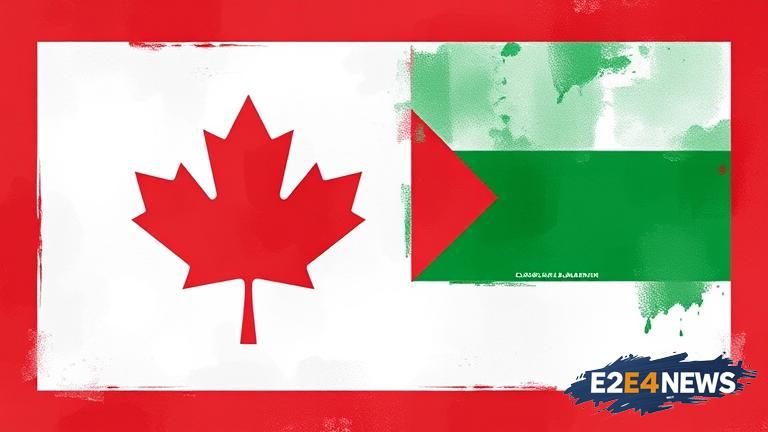In a recent statement, Mark Carney, a prominent Canadian politician, revealed that Canada intends to formally recognize Palestine as a sovereign state in September. This decision is anticipated to have far-reaching consequences for international relations, particularly in the context of the Middle East peace process. The recognition of Palestine by Canada is seen as a significant shift in the country’s foreign policy, as it has traditionally been aligned with the United States and Israel. The move is expected to be met with both praise and criticism from various quarters, with some hailing it as a step towards a more balanced approach to the Israeli-Palestinian conflict, while others may view it as a departure from Canada’s traditional stance. The decision to recognize Palestine is likely to be influenced by a range of factors, including humanitarian concerns, economic interests, and diplomatic relations with other countries. Canada’s recognition of Palestine may also have implications for its relationships with other nations in the region, including Israel, Jordan, and Egypt. The Palestinian Authority has long sought international recognition as a sovereign state, and Canada’s decision is likely to be seen as a major victory in this regard. However, the move may also be met with opposition from Israel, which has historically been opposed to Palestinian statehood. The Israeli government has long argued that Palestinian statehood can only be achieved through direct negotiations with Israel, and that international recognition would undermine this process. Despite these challenges, the recognition of Palestine by Canada is likely to be seen as a significant step forward for the Palestinian people, who have long been seeking international recognition and support for their right to self-determination. The move may also have implications for the role of the United States in the Middle East peace process, as Canada’s decision may be seen as a departure from the traditional US-Canada alliance on the issue. The US has historically been a strong supporter of Israel, and Canada’s recognition of Palestine may be seen as a challenge to this stance. In recent years, there has been growing international support for Palestinian statehood, with many countries recognizing Palestine as a sovereign state. The United Nations has also recognized Palestine as a non-member observer state, and there have been calls for the international community to take a more active role in supporting the Palestinian people. Canada’s decision to recognize Palestine is likely to be influenced by a range of factors, including its commitment to human rights and international law. The country has a long history of supporting humanitarian causes and promoting human rights around the world, and the recognition of Palestine may be seen as a natural extension of this commitment. The move may also have implications for Canada’s relationships with other countries in the region, including Iran and Turkey, which have historically been supportive of the Palestinian cause. In terms of the timing of the decision, September is likely to be a significant month for Canada’s foreign policy, as the country prepares to take a more active role in international affairs. The recognition of Palestine is likely to be just one part of a broader shift in Canada’s foreign policy, as the country seeks to promote its values and interests around the world. Overall, the decision to recognize Palestine as a sovereign state is a significant development in Canada’s foreign policy, and is likely to have far-reaching implications for international relations and the Middle East peace process. The move is expected to be met with both praise and criticism, and will likely be the subject of intense debate and discussion in the coming months. As the situation continues to evolve, it will be important to monitor the reactions of other countries and international organizations, and to consider the potential implications of Canada’s decision for the broader region. The recognition of Palestine by Canada is a significant step forward for the Palestinian people, and is likely to be seen as a major victory in their long struggle for international recognition and support. However, the move also raises important questions about the future of the Middle East peace process, and the role of the international community in supporting a lasting and just peace in the region. In the coming months, it will be important to consider the potential implications of Canada’s decision, and to think critically about the ways in which the international community can support the Palestinian people and promote a lasting peace in the region. The decision to recognize Palestine is a significant development in Canada’s foreign policy, and is likely to have far-reaching implications for international relations and the Middle East peace process. As the situation continues to evolve, it will be important to monitor the reactions of other countries and international organizations, and to consider the potential implications of Canada’s decision for the broader region.





